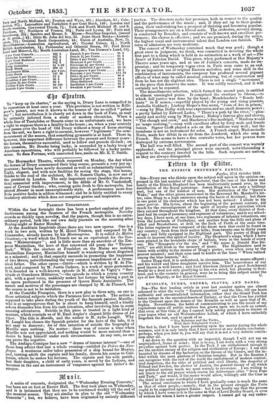PARISIAN THEATRICALS.
Within the last fortnight there has been a perfect explosion of pro- ductiveness among the theatres of the French metropolis. Novelty crowds so thickly upon novelty, that the papers, though this is no extra- ordinary period, look like our own daily journals on the morning after Boxing-night or Easter Monday. At the Academie Imperiale alone there are two new operas. One is a work in two acts, written by M. Henri Trianon, and composed by M. Limnauder, already known by his Montenegrins. It is called Is Maitre Chanteur,—a word which the French use as an equivalent for the Ger- man " Meistersiinger" ; and is little more than an anecdote of the Em- peror. MaTimilian, the hero of that renowned old poem the " Theuer- dank." While the electors at Frankfort on the Maine are making Mairimilinn Emperor, Maximilian himself is wandering about disguised as a minstrel; and in that capacity succeeds in promoting the happiness of two Avers, notwithstanding the very common impediment of a tyran- nical father. The other opera—Cokete—which is written by M. de Pla- nard, and composed by M. Justin Cadens, is a work of more pretension. It is founded on a well-known episode in M. Alfred de Vigny's "Ser- vitude et Grandeurs Militaires,"—the episode in which a young country girl, with a good voice, suddenly makes her fortune by taking a part in an opera performed in the presence of Queen Marie Antoinette. The names and motives of the personages are changed by M. de Planard, but the source is not to be mistaken.
At the Comedie Fran9aise, there is a new play in three acts, on one o. those artistica' subjects which the Parisians love so much. The action is supposed to take place during the youth of the Spanish painter, Murillo; who is so unprosperous that he is about to bang himself, until a kindly sefiora dissuades him from his rash intention, after involving him in some amusing adventures. Suicide in this piece is treated in a light kind of manner, which reminds us of M. Emil Augier's elegant little drama of La Oigue. The title is Murillo, and the author is M. Aylie Langle. Why M. Langle has chosen the Spanish painter for the hero of the tale, it is not easy to discover; for of this intention of suicide the biography of Murillo says nothing. No matter : there was of course a time when Murillo was not appreciated, and nothing would be more natural than a desire to hang himself under such circumstances. At any rate, no one can prove the negative. The Ambigu-Comique has a new "drama of intense interest "—one of those long affairs that last a whole evening—entitled La Priire des Nati- frages. A mutinous sailor takes possession of a ship bound for Mexico, and, turning adrift the captain and his family, directs his course to Cali- fornia, where he makes his fortune. The captain and his wife perish ; but their daughter, a child of early years, is saved by the Indians, and becomes in the end an instrument of vengeance against her father's de- stroyer.


























 Previous page
Previous page